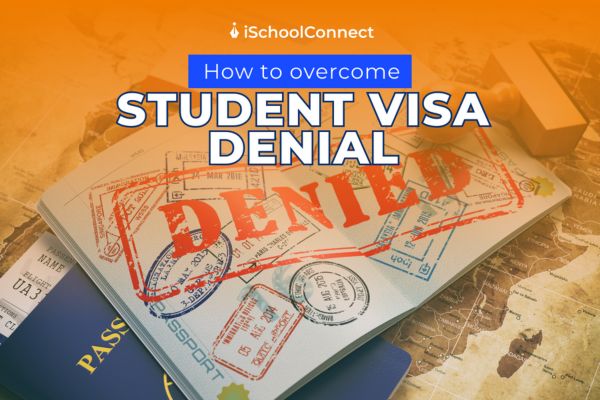Table of Contents
Understanding US visa rejections
Getting approved for a US student visa is essential to realize your dream of studying in the US. With a US student visa, you can apply to top institutions, internships, and other work-study programs. Not everyone is able to handle rejection effectively. Applicants cannot ignore all laws, particularly those pertaining to visas. Therefore, it is safe to be aware of the reasons why your US student visa can get rejected. In this blog, we will discuss the US student visa requirements, common reasons for denial, and how to overcome them.
US student visa requirements
Before initiating the application process, it’s crucial to understand the fundamental U.S. student visa requirements. The primary visa category for international students is the F-1 visa, designed for academic purposes such as attending a university, college, high school, language training program, or other academic institutions.
Documents required for a U.S. student visa
The documentation needed for a U.S. student visa is extensive and serves to establish your eligibility and intentions. Key documents include-
- Form DS-160- The applicants must duly fill out the online non-immigrant visa application form and submit it electronically.
- I-20 Form- Issued by the U.S. academic institution, the I-20 form is a Certificate of Eligibility for Nonimmigrant Student Status. It outlines details such as program duration, financial information, and the course of study.
- Passport- A valid passport is mandatory, with an expiration date beyond the intended period of stay in the U.S.
- Visa application fee receipt- Payment of the non-refundable visa application fee is a prerequisite.
- SEVIS fee receipt- Applicants must pay the Student and Exchange Visitor Information System (SEVIS) fee and the receipt present during the visa interview.
- Proof of financial ability- Demonstrate your ability to finance your education and living expenses in the U.S., which can be through bank statements, affidavits of support, or scholarship letters.
- Educational transcripts and diplomas- Provide evidence of your academic qualifications, including transcripts and diplomas.
- Standardized test scores- Some institutions may require scores for standardized exams, such as the IELTS or TOEFL, for English proficiency and other tests relevant to the chosen program.
The F-1 Student Visa

The F-1 visa is specifically for students seeking full-time academic education in the US. It allows for flexibility, permitting students to work on-campus during their studies and off-campus during designated periods.
Applying for a visa online
The US visa application process has transitioned to an online platform, streamlining the procedure for applicants. The first step involves completing Form DS-160 providing accurate and up-to-date information. Following submission, applicants are required to schedule a visa interview at the U.S. Embassy or Consulate in their home country.
During the interview, be prepared to discuss your educational plans, demonstrate financial stability, and clarify your intentions to return to your home country upon completing your studies. The U.S. visa interview is a critical step in the process, and a composed and truthful demeanor is essential.
English requirements for US student visas
Proficiency in English is a core component of the US student visa application. Most academic institutions in the US require international students to demonstrate their English language proficiency through standardized tests, such as the TOEFL or IELTS. These tests evaluate your reading, writing, speaking, and listening skills, ensuring you can effectively engage in an English-language academic environment.
Overcoming denials
Despite meticulous preparation, visa denials can still occur. Common reasons for denials include insufficient financial documentation, concerns about the applicant’s intent to return to their home country, or doubts regarding the legitimacy of the academic institution.
To overcome denials, consider the following strategies-
- Provide comprehensive and well-documented evidence of your financial ability to cover tuition, living expenses, and other associated costs.
- Clearly articulate your plans to return to your home country upon completing your studies. Emphasize ties to your home country, such as family, job prospects, or community involvement.
- Choose an accredited and recognized academic institution. Providing additional documentation, such as the institution’s accreditation status, can address concerns about the legitimacy of your educational pursuit.
Key takeaways
- The U.S. student visa application process demands meticulous attention to detail and adherence to formal protocols. Applicants should be diligent in understanding and meeting the requirements.
- The transition to an online visa application process streamlines the procedure. Completing Form DS-160 accurately and scheduling a visa interview are crucial steps in the process.
- Overcoming denials involves providing comprehensive financial evidence, clearly articulating plans to return home, and choosing accredited academic institutions with proper documentation.
Engage with the discussion! Share your thoughts in the comments section. If you need personalized assistance or have specific queries about studying abroad, don’t hesitate to reach out to us. Click here to contact our team. We’re here to guide you through every step of the educational journey.
Liked this blog? Read next: Top universities for architecture courses in 2024
FAQs
Q1. How can I seek assistance if my visa is denied?
Ans- If you face visa denial, consider seeking guidance from an immigration attorney or consulting with the educational institution’s international student services. They offer useful advice and help you navigate the appeal or reapplication process.
Q2. Is there a timeframe for reapplying after a visa denial?
Ans- While there’s no specific timeframe, addressing the issues leading to the denial is essential before reapplying. Take the necessary time to gather additional documentation and strengthen your application to avoid rejection.
Q3. Are there age limitations for obtaining a student visa?
Ans-Generally, there are no age limitations for obtaining a U.S. student visa. Admission decisions are based on academic qualifications and intent to study. Age alone is not a determining factor for visa approval.






